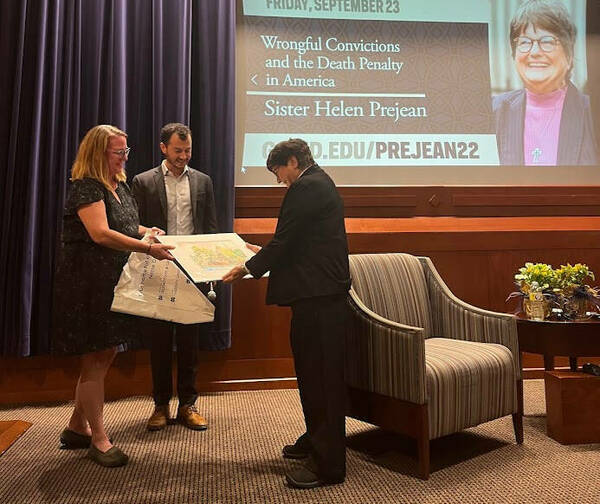
On September 23, Sr. Helen Prejean participated in a fireside chat hosted by the Notre Dame Law School Exoneration Justice Clinic and the Klau Institute for Civil and Human Rights. The fireside chat was moderated by dean and professor of law G. Marcus Cole in the Eck Visitors’ Center.
Prejean said she believes that all humans, even those who have committed terrible crimes, have an inviolable dignity. She also discussed justice for people who were wrongfully convicted, the presence of racism and socioeconomic disparities within our criminal justice system and how Catholics are called to be activists for the most ostracized in society: convicts.
“Where is the dignity in taking a human being, rendering [him] completely defenseless and deliberately killing him when we have other means to keep society safe?” Prejean asked.
Prejean has been recognized as one of the nation’s leading anti-death penalty advocates. She is a recipient of the Laetare Medal, the highest honor that can be bestowed upon a Catholic.
Prejean rose to prominence for her 1993 book “Dead Man Walking,” in which she told the story of accompanying Patrick Sonnier to his execution on death row. Her book was later turned into a 1996 Academy Award-winning film.
In recent years, Prejean has accompanied Manuel Ortiz, a resident at a Louisiana prison who has been on death row for over 25 years.
“I came alive by going to death row,” Prejean said.
She encourages all young people to choose “soul-sized work” that truly stimulates them and fills them with energy. She said she has found her true calling in befriending those on death row, a task which she said “keeps her soul awake.”
When asked how she remains joyful and good-natured despite encountering those nearing death, Prejean said that being in the presence of those who society has turned its back on can be extremely taxing. But, she said the horror of the situation and these inmates’ impending execution dates left her with one of two options.
“I could either be paralyzed with grief and fear or galvanized to work harder,” she said.
Prejean noted she chose the latter.
She has published two books, met with the Pope and has spoken out against the death penalty in communities across the globe.
Her work with death-row inmates is also an acknowledgment of her own privilege, both in her whiteness and in her socioeconomic status.
She presented data on racial disparities within prisons and the fact that eight in every 10 people placed on death row were put there for committing a crime against a white person.
“For those of us who have white privilege, we’ve got a special responsibility with God to help those who don’t,” Prejean said.
But perhaps the most gratifying part of Prejean’s work and the reason why her soul feels so “alive” in counseling death row inmates, is that she has found true connections with the men she has accompanied. She said they have taught her, most notably, to be both “courageous” and “repentant.”
“I haven’t met with anyone guilty who isn’t sorry,” Prejean said.
In her current accompaniment with Ortiz, she hopes to help prove his innocence.
“After being in the presence of Manuel, I leave more of a human being than when I first arrived,” Prejean said.
She hopes to emphasize the humanity of all those that she has accompanied, innocent or not.
Prejean called all of us to be more empathetic, both to the families of the victims and to those who the state will strip of their lives.
“Is he innocent? No,” Prejean said of a hypothetical death-row inmate. “Is he human? Yes.”
To Prejean, Catholicism and activism go hand in hand. Because theology is so often linked and used to support the death penalty, she said the first step to abolishing it is to begin dialogue.
Prejean said Jesus always chooses life, and as Catholics, we must, as well. She noted that the one chance Jesus had to condone the death penalty was the woman at the well. He instead chose life and encouraged the woman to reflect on her own life.
To Prejean, the death penalty isn’t a political issue.
“Are you liberal or conservative? Are you this or that? It’s not the point,” she said. “Stick with the issues, and explore them together. Listen to each other.”
Through education and empathy, Prejean is hopeful that both the Catholic church and the legal system are moving in the right direction, one in which life is preserved, innocent or not. As humans, Prejean said everyone has an indisputable dignity that should never be stripped away.
Originally published in The Observer.